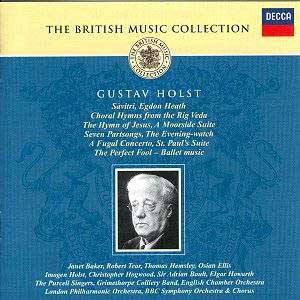This is well nigh perfection. The lack of the sung
texts just misses perfection. However for generosity and interpretative
acumen you will not match this anthology at any price let alone the
mid/bargain bracket. This series is clearly pitched at those beguiled
by EMI's British Composers series (mid-price) and the indefatigably
produced cornucopiac riches of the Naxos catalogue. To gild the lily
the discs are packed close to the absolute limits of generosity.
Decca have done well to steer clear of the easy choice
of The Planets. Instead they have trawled the back catalogue
as far as the 1960s for some classic interpretations. While analogue
hiss is present the glamorous intrinsic qualities of the music more
than compensate.
The Choral Hymns from the Rig Veda are examples
of Holst's cool, mithril delicacy. He lacks nothing in sensuous expression
though his music never topples over into the sort of eroticism we find
in Franck's glorious Psyché or Scriabin's Poem of Ecstasy.
The four hymns are taken by the sopranos and altos of the Purcell
Singers who bring out the clean lines and unhandselled innocence of
the writing - repeatedly echoing and pre-echoing the Whitman-based
Ode to Death and the mysteries of the double handful of Wolfe
Songs. The harpist is Osian Ellis. These songs are accompanied by
harp alone whereas the Seven Part Songs are with string orchestra.
They are a natural partner to Finzi's Bridges Songs and Moeran's
Songs of Springtime. Especially beautiful are O Love I Complain
and Susan Longfield's soprano solo in Love on my heart. The Evening-Watch
sets, with dignity and restraint, the dialogue between soul and
body.
Savitri is a chamber opera of the same dimensions
as The Wandering Scholar. This is a tale of Death outfoxed by
love - a sort of Dravidian Orfeo. Robert Tear is in full flower
while Janet Baker darkly colours the proceedings deploying the darker
part of her register. Even in celebration this deeply sincere score
is never showy in a coloratura way. Felicity Palmer's Hyperion recording
on Helios is rather weakened by the quavery tone of her two men although
hers is of course a much more recent recording. The opera is in five
tracks.
All the above tracks are in analogue from 1965.
Hogwood takes the Fugal Concerto and the St
Paul's Suite at a much speedier lick than Imogen Holst in her Lyrita
recordings. The effect of this is to bring out the Dumbarton Oaks
and Pulcinella parallels and I am not sure I like this. The
St Paul's Suite stands up far better to this treatment but even
so at this pace things can sound graceless - even brutal.
Next come three works that form the content of one
of the most famous Holst Decca SXL LPs of all time. These are all conducted
by Boult and though the recordings date from 1961/2 they sound handsome
and ruddily healthy. This is especially so in The Perfect Fool music
where I detect the same almost petulant boisterous elan found in Boultís
much underrated Sibelius tone poems on Vanguard (Omega Classics). The
Dance of the Spirits of Fire spits and flames, barracks and belches
with brassy energy. The gang of trombones still sound rudely healthy
and bellicose - a tribute to FFRR legacy technology.
The following two works show Holst at zenith. Egdon
Heath is a tone poem in which Sibelian woodwind and grim Janacek-like
writing probe the Hardy-inspired parallels between the eponymous heath
of 'The Return of the Native' and indomitable tragic humanity. It is
helpful that Kenneth Chalmers in his notes reminds us that this work
was commissioned by the New York SO who premiered it in February 1928.
In it I hear other echoes - Roy Harris's epic stride and string writing,
a dash of Sibelius (a Damrosch favourite of those years), even a work
that Holst presumably did not know - Constant Lambert's Music for
Orchestra.
The second work is the Hymn of Jesus written
near the perigee of the Great War in 1917. It is a blustering, subtle
and revolutionary antidote to the cloying suffocation of the British
oratorio tradition. This is a work that reset the clocks and paved the
way for Ligeti's choral writing, for Foulds' World Requiem and
for Walton's Belshazzar's Feast; not to mention Howard Hanson's
similarly glorious Lament for Beowulf. Holst did not shrink from
a cloud of whispering sprechgesang aping some celestial fugal
rite. He embraced plainsong in the Vexilla Regis, passages uncannily
similar to JanŠček's Glagolytic
Mass and a serene reaching out towards unknown regions and all without
a whiff Stanfordian Ďrum-ti-tumí. In short Holst completely cast off
the ordinary in writing about the extraordinary.
Lastly Elgar Howarth unleashes the Moorside Suite
- written in the same year as Egdon Heath. The Grimethorpe
play with customary skill and subtlety delighting in Holst's way with
layered counterpointing and always furnishing ear-catching intrigue
at tuba level all the way up to the trumpet line. The analogue tape
still sounds superb wearing its quarter century with stylish ease. The
second movement is done at just the right tempo. Am I the only one to
wonder whether Finzi had heard this movement before he wrote the song
To Lizbie Brown. Rather a shame that Decca chose to present this
multi-movement suite in a single track. The last movement still sounds
absolutely cracking with rasping truculent impact and a determined rhythmic
blast.
Rob Barnett


